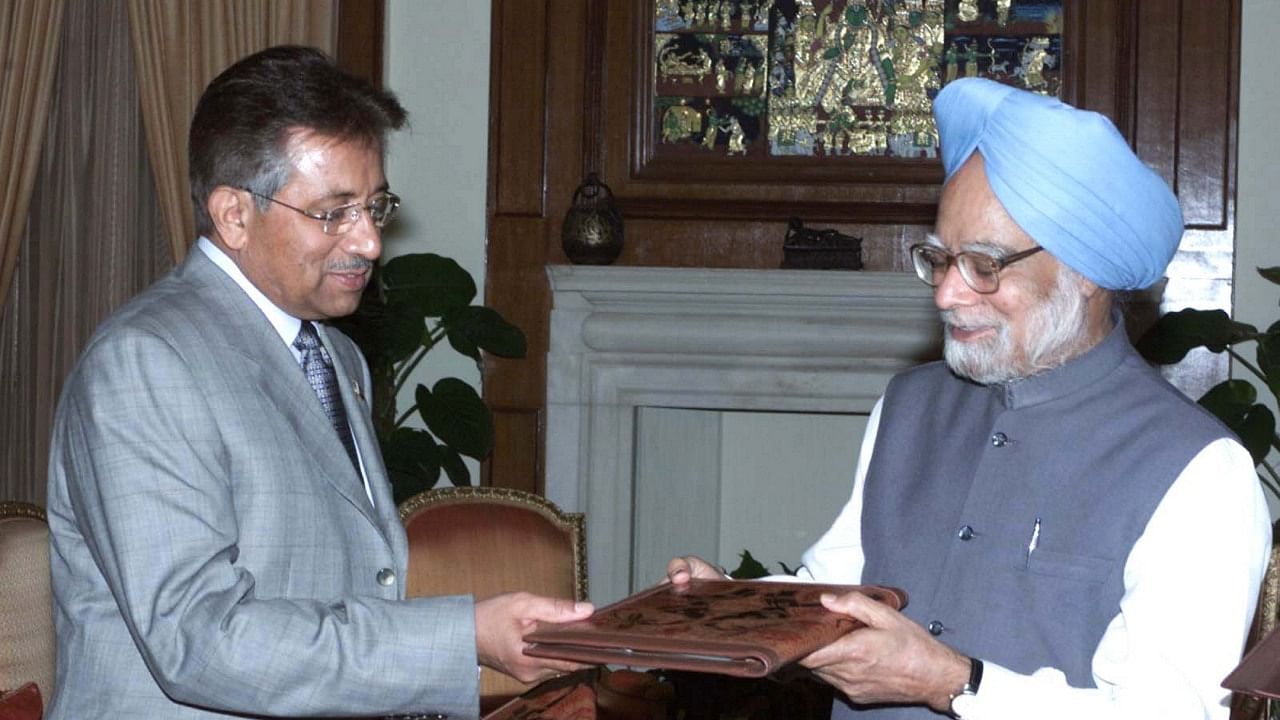
The blood spilled during the 1999 Kargil War, the failure of the 2001 Agra Summit and the near-breakthrough in his regime’s back-channel talks with the governments of Atal Bihari Vajpayee and Manmohan Singh – Pakistan’s former president, General Pervez Musharraf, will be remembered in India for his chequered legacy.
Musharraf, who has breathed his last at Dubai on Sunday, allegedly put out the flicker of hope that people of the sub-continent had seen after Vajpayee had taken a bus ride from Delhi to Lahore in February 1999 and joined his then counterpart M Nawaz Sharif in a historic summit. Just a few weeks after Vajpayee and Sharif had signed the 'Lahore Declaration' committing to avoid competition to build nuclear arsenal and conventional and non-conventional conflicts, Musharraf, then chief of the Pakistan Army, sent his soldiers and the terrorists, who were on the payroll of the “deep state” he was leading, to occupy the mountain heights along the Line of Control (LoC) between his country and India. The Indian Army responded and the Kargil War ensued.
Sharif had later claimed that he had no knowledge about the Pakistan Army’s moves that had led to the Kargil Conflict. He had also accused Musharraf of backstabbing him.
But after he deposed Sharif in a bloodless coup and took over as the head of the Government of Pakistan, first as the “Chief Executive” in October 1999 and then as the President in June 2001, Musharraf managed to project himself as a champion of dialogue between his country and India.
Though his Inter Services Intelligence (ISI) continued to send terrorists across the LoC, particularly to carry out attacks in Jammu and Kashmir, Musharraf on July 14, 2001 landed in New Delhi with his wife Sehba for a summit with Vajpayee in Agra. The first day of the summit appeared promising, with the Pakistani President discussing with the Prime Minister of India a four-point peace proposal – withdrawal of troops by both sides in phases along the LoC without any changes in the borders of Kashmir, allowing people of J&K to travel freely across the LoC and a degree of self-governance, but not independence, for J&K and a joint authority to oversee matters related to J&K.
The 'Agra Summit', however, collapsed, on the second day itself, particularly due to Musharraf’s public grandstanding in a breakfast meeting with editors of the media outlets of India and his refusal to give an adequately convincing assurance to Vajpayee on stopping infiltration of terrorists from Pakistan to India and helping bring down violence in J&K.
Though the attack on Parliament of India by terrorists from Pakistan on December 13, 2001 escalated tension, the two sides had a ceasefire agreement on November 26, 2003. Vajpayee and Musharraf met again in Islamabad in January 2004 and the two sides agreed to launch the Composite Dialogue process.
Singh hosted Musharraf in April 2005, when the Pakistani President, who was born at a hospital in Kamla Market in Delhi in August 1942, received a unique gift – his birth certificate. The back-channel talks gathered steam after Singh succeeded Vajpayee and, by 2007, the special envoys of New Delhi and Islamabad, S K Lambah and Tariq Aziz, were close to working out a four-point formula to end the historic rivalry between the two nations. The formula was a modified version of what Musharraf had presented before Vajpayee. Musharraf resigned as President of Pakistan on August 18. Three months later, the November 26-28, 2008 terror attacks in Mumbai by the terrorists, who had sailed from Pakistan to India, ended the possibility of the breakthrough reached in back-channel talks being formalized.
